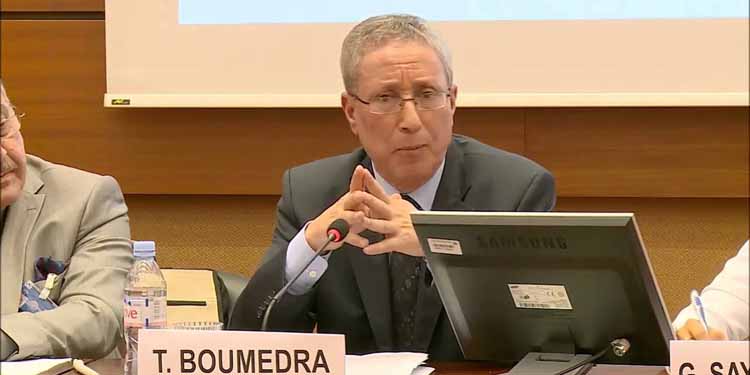Taher Boumedra, Former Chief of the Human Rights Office of the United Nations Assistance Mission for Iraq joined the Online Free Iran Global Summit—day 2. In his remarks, Mr. Boumedra said, “We will continue our work with JVMI for justice for the victims of the 1988 massacre.”
In July 1988, the Iranian religious fascism’s founder and the first supreme leader Ruhollah Khomeini issued a fatwa ordering the execution of imprisoned opponents, including those who had already been tried and were serving their prison terms. This was the beginning of what turned out to be the biggest massacre of political prisoners since World War II.
Following the decree, some 30,000 political prisoners were extra-judicially executed within several months. Today, thanks to the initiative of Mrs. Maryam Rajavi, president-elect of the National Council of Resistance of Iran (NCRI), known as “Call for Justice” many legal and international bodies have joined the families of victims in search of justice.
Here is the speech of Mr. Boumedra:
We all agree that the crime committed against political prisoners in Iran in 1988 is firmly established. It’s well documented and all parties concerned have been informed. The United Nations, with all the relevant institutions, has been informed and is receiving documentations on this issue. I was a little disappointed that the Special Rapporteur on the Situation of Human Rights in Iran is saying the same thing two years later. This follows the progress made on the first of February, 2018, when former High Commissioner of Human Rights Zeid Raad Al Hussein, who was on the point of leaving Geneva, made the declaration that the U.N. recommended the authorities in Iran investigate this crime. But we know very well that Iran, the mullah regime, will not investigate. And it will be nave to believe that the mullahs would investigate themselves.
So, let’s address this warning message to the United Nations that enough is enough. The Iranian regime will not investigate its own crimes. But, I must also underline the fact that since 2015, at the launch of this campaign that related to the massacre of the political prisoners, we have come a long way. And the United Nations is nowadays very aware of what happened in the summer of 1988 in Iran. The crime is already there, and everybody could see it. The United Nations is aware of it. It must not leave room for impunity. Impunity, so far, has emboldened the Iranian authorities to continue their crimes.
It’s time now to probably think about a coalition of the civil society and the NGOs to lobby all together to make sure that we find a way for taking this crime to court, national courts all over the world, those courts who will accept universal jurisdiction. There is a possibility of doing so. But there is also the possibility of lobbying member states of the Security Council for a referral of the case to the ICC, to International Criminal Court.
We will continue our work with JVMI for justice for the victims of the 1988 massacre. JVMI will continue to work. We will seek arrest and prosecution in any courts that will be willing to accept universal jurisdiction. But, our work should remain to lobby for a referral to the ICC.
